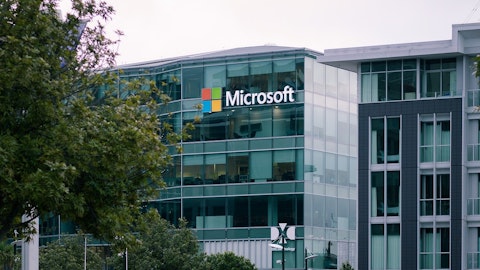1. Microsoft Corporation (NASDAQ:MSFT)
Market Capitalization: $2.27 trillion
2022 Total Revenue: $204.1 billion
Microsoft Corporation (NASDAQ:MSFT) is a Redmond, Washington-based technology behemoth known for its diverse range of software, hardware, and consumer electronics. Microsoft Corporation’s (NASDAQ:MSFT) quantum computing technology is based on a topological qubit approach, which uses quasi-particles called Majorana fermions to create a highly stable and error-resistant qubit. The company’s quantum computing system consists of a set of interconnected qubits that can be programmed and manipulated using a set of control signals. Microsoft Corporation (NASDAQ:MSFT) has also developed a suite of software tools and algorithms for programming and simulating quantum computations, including the Microsoft Quantum Development Kit and the Microsoft Quantum Simulator.
Baron Funds shared its outlook on Microsoft Corporation (NASDAQ:MSFT) in its Q1 2023 investor letter. Here’s what the firm said:
“Shares of mega-cap software and cloud vendor Microsoft Corporation (NASDAQ:MSFT) performed well during the quarter despite mixed fiscal second quarter results. Microsoft’s largest consumer business, Windows licensed to computer vendors, decreased sharply year-over-year as last year’s results were bolstered by pandemic-related purchases. Its key commercial business, reported as Microsoft Cloud, grew 29% on a constant-currency basis, beating Wall Street expectations. Drilling down, its Azure cloud computing business also beat expectations, growing 38% on a constant-currency basis, but growth slowed in December, and management’s forward guidance was for further deceleration to a low 30% level. Since tougher macro trends emerged last year, cloud businesses, like Azure, have faced headwinds from enterprise customers optimizing their cloud workloads and spending, after a brisk pace of expansion over the last two years. Microsoft CEO Satya Nadella addressed this during the last earnings call: “Just as we saw customers accelerate their digital spend during the pandemic, we are now seeing them optimize that spend…. This is an important time for Microsoft to work with our customers, helping them realize more value from their tech spend and building long-term loyalty…. Moving to the cloud is the best way for any customer in today’s economy to mitigate demand uncertainty…while gaining efficiencies of cloud-native development…. I fundamentally believe tech as a percentage of GDP is going to be much higher…on a secular basis…. [W]hat [customers] accelerated during the pandemic, they’re making sure they’re getting most value out of it or optimizing it.… [A]t some point the optimizations will end…[and] the money that they save in any optimization of any workload is what they’ll plow into new workloads and those workloads will start ramping up.” Our research continues to indicate that the long-term secular trend of cloud computing remains healthy and intact and will only be boosted by the AI inflection. Morgan Stanley recently issued a report titled “Cloud Optimization: Short Term Pain for Long Term Gains.” It echoed Nadella’s commentary and our own internal research, concluding that today’s cloud optimization would ultimately yield “higher cloud adoption, upsizing [the] opportunity by 30% longer term.” The key finding of this report, supported by a survey of 80 chief information officers across the U.S. and Europe, was optimization is increasing the expected penetration of the cloud longer term, with 57% of workloads expected to reside in the cloud post-optimization vs. 45% of workloads pre-optimization.
Insider Monkey focuses on uncovering the best investment ideas of hedge funds and insiders. Please subscribe to our free daily enewsletter to get the latest investment ideas from hedge funds’ investor letters by entering your email address below. You can also check out our articles on the 15 States With the Biggest Drug Problems in 2023 and the Top 10 Roofing Companies in the United States.




